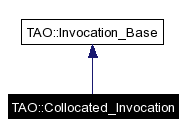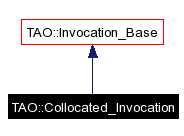
#include <Collocated_Invocation.h>
Inheritance diagram for TAO::Collocated_Invocation:


Public Member Functions | |
| Collocated_Invocation (CORBA::Object_ptr t, CORBA::Object_ptr et, TAO_Stub *stub, TAO_Operation_Details &detail, bool response_expected=true) | |
| Constructor used by TAO::Invocation_Adapter. | |
| Invocation_Status | invoke (Collocation_Proxy_Broker *cpb, Collocation_Strategy strat) |
Private Member Functions | |
| Collocated_Invocation (void) | |
|
||||||||||||||||||||||||
|
Constructor used by TAO::Invocation_Adapter.
|
|
|
|
|
||||||||||||
|
Practically this method is a place holder to do the following
|
 1.3.9.1
1.3.9.1